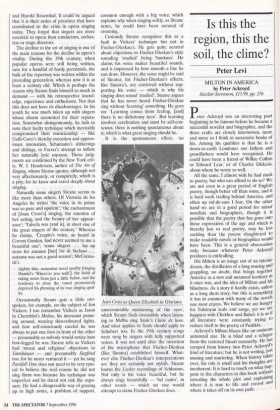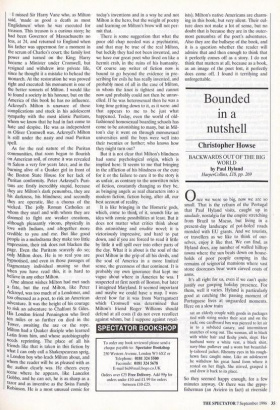Is this the region, this the soil, the clime?
Peter Levi
MILTON IN AMERICA by Peter Ackroyd Sinclair-Stevenson, £15.99, pp. 276
Peter Ackroyd was an interesting poet beginning to be famous before he became a successful novelist and biographer, and the three crafts are closely interwoven, more and more so I think in successive books of his. Among his qualities is that he is a down-to-earth Londoner our fathers and grandfathers would have recognised. He could have been a friend of Wilkie Collins or Edward Lear, or of Charles Dickens, about whom he wrote so well.
All the same, I almost wish he had stuck to poetry, but who can afford to do so? We are not even in a great period of English poetry, though better off than some, and it is hard work trailing behind America, and often up cul-de-sacs I fear. On the other hand we are in a good period for minor novelists and biographers, though it is possible that the poetry that has gone into these expressions of the age and which is thereby lost to real poetry, may be less exciting than the poems slaughtered to make readable novels or biographies would have been. This is a general observation only, because whatever Peter Ackroyd produces is enthralling. His Milton is an image out of an intense dream, the distillation of a long musing and grappling, no doubt, that brings together America as a new and untamed territory as it once was, and the idea of Milton and his blindness. As a story it hardly exists, unless as a long short story, but this is something it has in common with many of the novels one most enjoys. We believe we are hungry for Tolstoyan scale and range, yet we are happiest with Chekhov and Babel: it is as if all literature were constantly trying to reduce itself to the poetry of Pushkin.
Ackroyd's Milton blazes like an ominous autumnal star. He is blind and a refugee from the restored Stuart monarchy. He has escaped from history into Peter Ackroyd's kind of literature; but he is not writing, just musing and muttering. When history takes over, his role is small and his thoughts are incoherent. It is hard to touch on what hap- pens to the characters in this book without revealing the whole plot and explaining Where it is true to life and record and where it takes off on its own path. I missed Sir Harry Vane who, as Milton said, 'made as good a death as most Englishmen' when he was executed for treason. This treason is a curious story; he had been Governor of Massachusetts no less, at 24, and returned to England when his father was uppermost for a moment in the scrum of Charles's court; the family lost power and turned on the King; Harry became a Minister under Cromwell, but resigned and withdrew into private life, since he thought it a mistake to behead the monarch. At the restoration he was proved right and executed: his monument is one of the better sonnets of Milton. I would like to found a society in his honour, but on the America of this book he has no influence. Ackroyd's Milton is unaware of these complications and stuck in his adolescent sympathy with the most idiotic Puritans, whom we know that he had in fact come to hate and despise. He was as independent as Oliver Cromwell was. Ackroyd's Milton is still under the nasty and mad Puritan spell.
As for the real nature of the Puritan communities, that soon began to flourish on American soil, of course it was revealed in Salem a very few years later, and in the burning alive of a Quaker girl in front of the Boston State House for her lack of Puritan conformity. Peter Ackroyd's Puri- tans are firstly incredibly stupid, because they are Milton's dark penumbra, they are his darkness, his blindness; and secondly they are operatic, like a chorus of the wicked. The jolly Roman Catholics at whom they snarl and with whom they are doomed to fight are weaker creations, although pleasantly vinous, physically in love with Indians, and altogether more credible to you and me. But like good People in a melodrama they make too little impression, their ink does not blacken the Page. Even the Puritans scarcely do so; Only Milton does. He is so real you are hypnotised, and even in those passages of fragmentary individual musing so that when you have read this, it is hard to believe in any other Milton.
One almost wishes Milton had met such a fate, but the real Milton, like Peter Ackroyd, was too much of a Londoner, and too obsessed as a poet, to risk an American adventure. It was the height of his courage to risk an adventure to Chalfont St Giles. His London friend Pennington who lived ten miles or so further on died in the Tower, awaiting the axe or the rope. Milton had a Quaker disciple who learned Latin from him, and whose autobiography needs reprinting. The place of all his friends like that is taken in this fiction by what I can only call a Shakespearean sprig, a London boy who leads Milton about, and whom the reader will be as pleased with as the author clearly was. He cheers every scene where he appears, like Lancelot Gobbo, and he can act, he is as sharp as a razor and as inventive as the Swiss Family Robinson. He is a most unusual comic for
today's inventions and in a way he and not Milton is the hero, but the weight of poetry and learning on Milton's brow will not per- mit that.
There is some suggestion that what the poor old chap needed was a psychiatrist, and that may be true of the real Milton, but luckily they had not been invented, and we have our great poet who lived on like a hermit crab, in the ruins of his humanity. Of course any writer of fiction now is bound to go beyond the evidence in pre- scribing for evils he has really invented, and probably most of all in the case of Milton, in whom the knot is tightest and cannot now and probably could not then be unrav- elled. If he was heterosexual then he was a long time getting down to it, as it were: and that appears to me to be just what happened. Today, even the world of old- fashioned homosexual boarding schools has come to be astonishing to many, but in Mil- ton's day it went on through monosexual universities until the boys were well into their twenties or further; who knows how they might turn out?
But it is not clear that Milton's blindness had some psychological origin, which is implied here. It seems to me that bringing in the affliction of his blindness or the cure for it or the failure to cure it to the story is as unfair, as contrary to the unwritten rules of fiction, constantly changing as they be, as bringing angels as real characters into a modern fiction, fiction being, after all, our best account of reality.
It is like bringing in the Homeric gods, which, come to thinl, of it, sounds like an idea with comic possibilities at least. But it does not matter what critics think about this astonishing and erudite novel; it is victoriously impressive, and hard to put down, and if you are forced to read it little by little it will spill over into other parts of the day. What it is about is the soul of the poet Milton in the grip of all his devils, and the soul of America in a more limited sense, the greenness of that continent. It is probably my own ignorance that kept me vague about where in America he was. I suspected at first north of Boston, but later I imagined Maryland. It seemed important and maybe we could have a map. I won- dered how far it was from Narragansett which Cromwell was determined that Milton's friend Roger Williams should defend at all costs (I do not even recollect against whom, but I suppose against royal- ists). Milton's native Americans are charm- ing in this book, but very silent. Their cul- ture does not make a lot of sense, but no doubt that is because they are in the outer- most penumbra of the poet's adventures. Also they are the bullseye of the book, and it is a question whether the reader will admire that and then enough to think that it perfectly comes off as a story. I do not think that matters at all, because as a book, as an image of the poet lost, it perfectly does come off. I found it terrifying and unforgettable.



























































 Previous page
Previous page